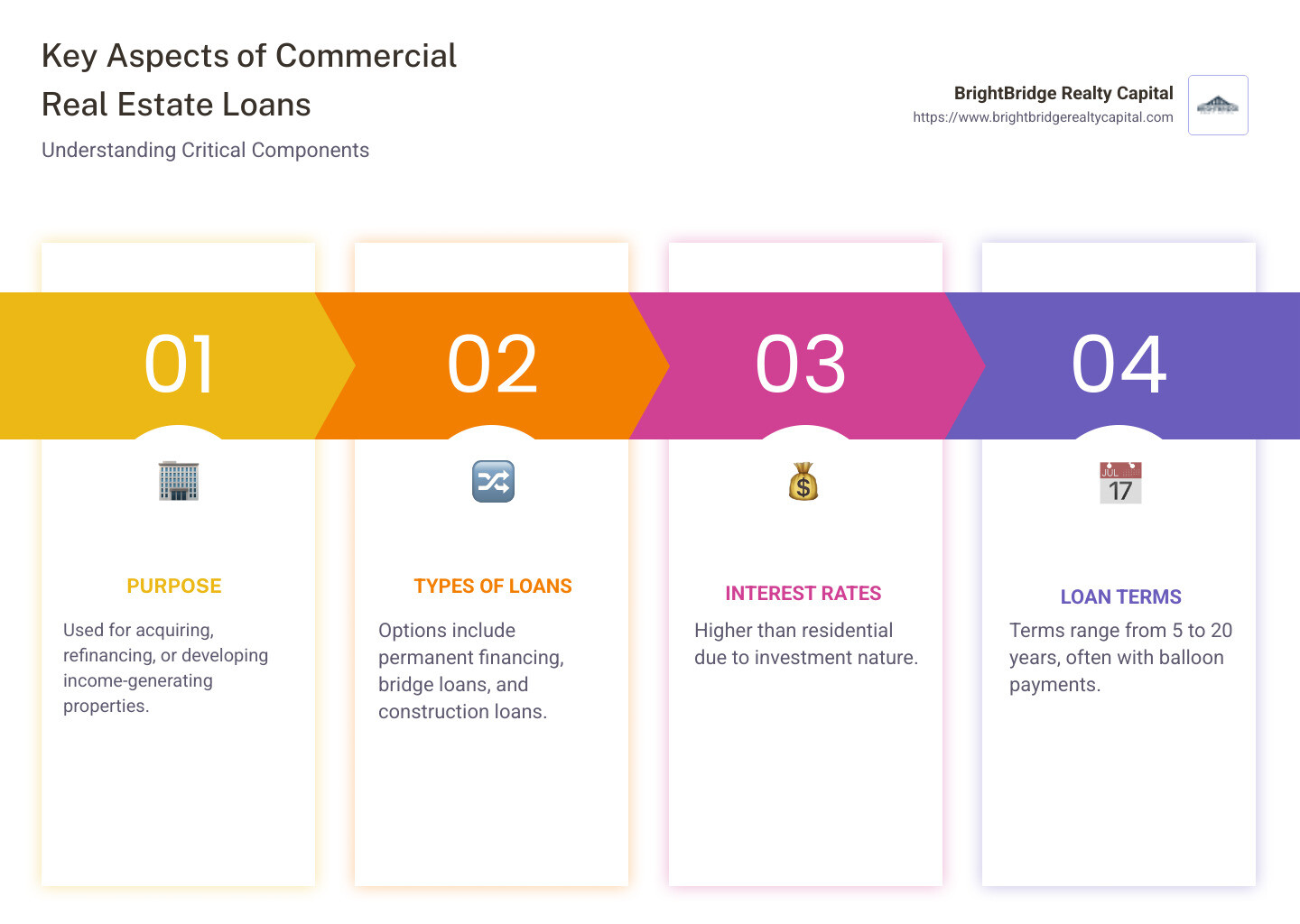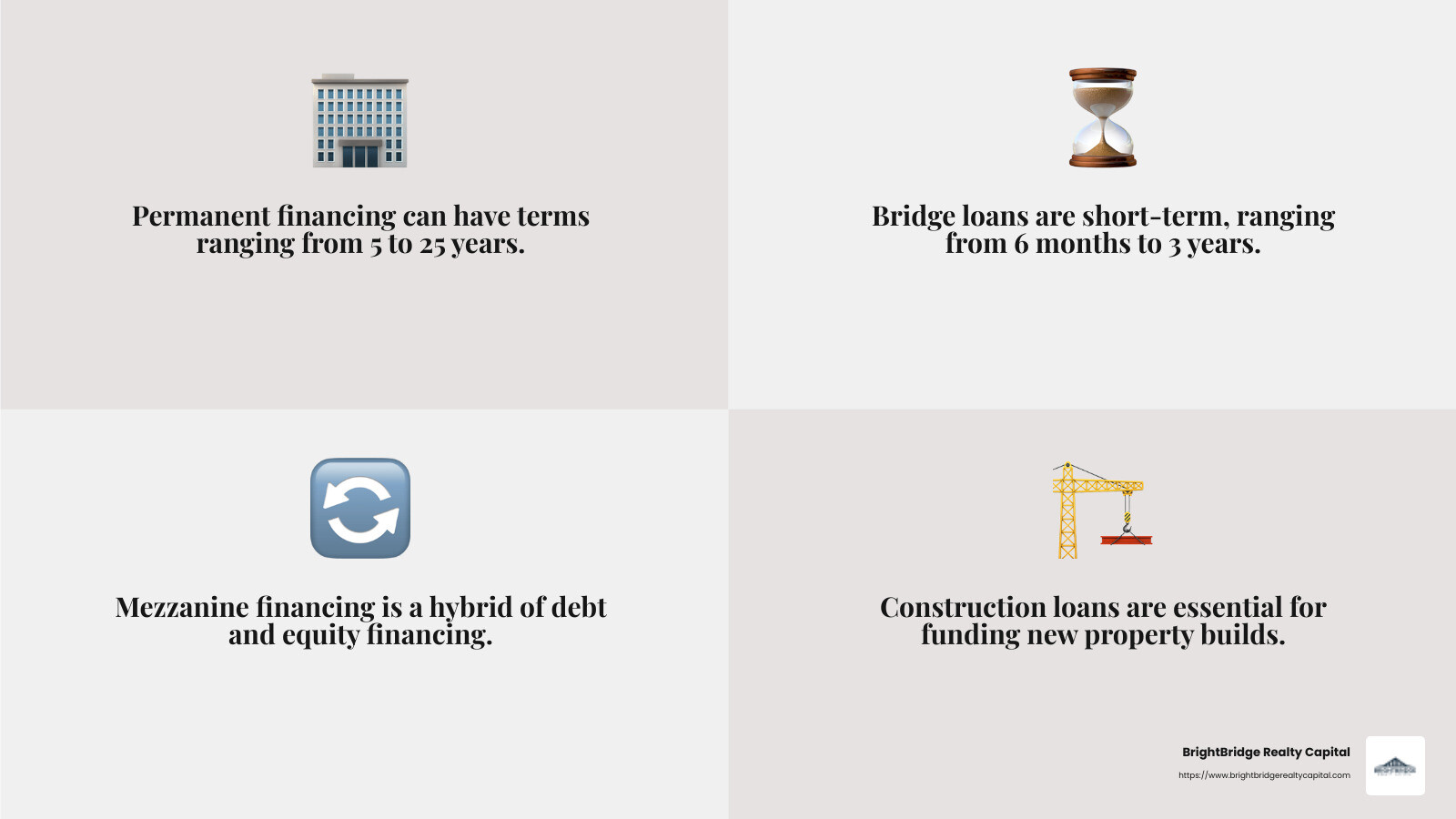Navigating the World of Commercial Real Estate Financing

Commercial real estate loans are more than just a financial tool; they are the key to open uping opportunities in the property market. For investors aiming to expand their rental portfolios or undertake ambitious fix-and-flip projects, understanding the nuances of these loans is crucial.
Here's a quick overview of what commercial real estate loans offer:
- Purpose: Primarily for acquiring, refinancing, or developing income-generating properties.
- Types: Include options such as permanent financing, bridge loans, and construction loans.
- Interest Rates: Tend to be higher than residential loans due to the nature of the investment.
- Loan Terms: Typically range from 5 to 20 years, with balloon payments often required.
Whether you're eyeing a sleek new office building in New York or planning to revamp a tired old motel into a chic boutique hotel, commercial real estate financing solutions provide the backbone for these entrepreneurial ventures.
The path to securing the right loan can seem intricate, with many variables like borrower creditworthiness and the economic climate playing a role in determining terms and rates. By engaging with lenders around the country, investors can find custom solutions that align with their specific needs and goals.
Navigating this world requires not just know-how, but a strategic approach to financial planning and relationship-building with financial institutions.

Explore more about commercial real estate loans:
Understanding Commercial Real Estate Loans
When it comes to commercial real estate loans, understanding the basics can make all the difference in securing the best financing for your needs. Let's break down the essentials.
Loan Types
Commercial real estate loans come in various forms, each custom to the specific needs of the borrower and the nature of the property.
Permanent Financing: Ideal for long-term investments, this type of loan is used to purchase or refinance stabilized, income-producing properties. The terms are usually longer, ranging from 5 to 20 years, and are accompanied by a fixed or variable interest rate.
Bridge Loans: These short-term loans are perfect for investors who need to act quickly. They provide temporary financing until a more permanent solution is found. Bridge loans typically have higher interest rates due to their short duration and the urgency involved.
Construction Loans: When building from the ground up, construction loans finance the development of new properties. They cover the costs of construction and are usually converted into a permanent loan once the project is complete.
SBA Loans: Offered through the U.S. Small Business Administration, these loans are designed to support small businesses looking to purchase or improve commercial properties. They often come with favorable terms and lower interest rates compared to traditional loans.
Collateral
Collateral is a critical component of commercial real estate loans. It serves as the lender's security, ensuring that the loan is backed by tangible assets. In most cases, the property being purchased or developed acts as the collateral. This means if the borrower defaults, the lender can seize the property to recoup their losses.
Income-Producing Properties
The primary focus of commercial real estate loans is on income-producing properties. These include a wide range of real estate types, such as:
- Office Buildings: Spaces leased to businesses for operational purposes.
- Retail Spaces: Properties rented to retailers for selling goods and services.
- Industrial Properties: Facilities used for manufacturing, storage, or distribution.
- Multi-Family Units: Apartment complexes or residential buildings with multiple units rented out to tenants.
The income generated from these properties plays a significant role in assessing the borrower's ability to service the loan. Lenders often look at projected cash flows and occupancy rates to gauge the potential return on investment.

By understanding these foundational elements of commercial real estate loans, investors can better steer their options and make informed decisions that align with their financial goals and property aspirations.
Types of Commercial Real Estate Loans
When diving into commercial real estate loans, it's crucial to understand the different types available. Each loan type serves a unique purpose and is designed to meet specific needs.
Permanent Financing
Permanent financing is the backbone of long-term real estate investments. This loan type is used to purchase or refinance properties that are already generating income. With terms typically ranging from 5 to 25 years, these loans can have either fixed or variable interest rates. They're perfect for investors seeking stability and predictability in their payments over time.
Bridge Loans
Need quick funding? Bridge loans are your go-to option. These short-term loans help investors seize opportunities without delay. They act as a temporary solution, providing financing until a more permanent loan can be secured. Due to their short duration—usually 6 months to 3 years—and the urgency involved, bridge loans often come with higher interest rates.
Mezzanine Financing
Mezzanine financing is an intriguing option for those looking to fill the gap between the primary loan and the total project cost. This type of loan is a hybrid of debt and equity financing. It allows lenders to convert the debt into an equity interest if the borrower defaults. It's a flexible solution often used in large-scale commercial projects where additional capital is needed beyond what traditional loans offer.
Construction Loans
For developers aiming to build from scratch, construction loans are essential. These loans cover the costs of constructing new properties. They provide the necessary funds during the building phase and are typically converted into permanent financing once the project is completed. This conversion ensures a seamless transition from construction to occupancy.
SBA Loans
The U.S. Small Business Administration offers SBA loans, custom to support small businesses in acquiring or improving commercial properties. There are two main types: SBA 7(a) loans and SBA 504 loans.
SBA 7(a) Loans: These are versatile and can be used for acquiring land or property. They offer a maximum loan amount of $5 million.
SBA 504 Loans: These loans can reach up to $15 million and are ideal for purchasing major fixed assets. They involve more paperwork and longer approval timelines but offer the advantage of up to 90% leverage on properties.

By understanding these various loan types, investors can choose the right commercial real estate loan that aligns with their project goals and financial strategy.
Factors Influencing Commercial Real Estate Loan Rates
When looking for commercial real estate loans, understanding what affects the interest rates is key. Several factors come into play, each impacting the cost of borrowing in different ways.
Interest Rates
Interest rates are one of the most significant factors. These rates can vary based on the broader economic environment. For example, when the economy is strong, rates might be higher as demand for loans increases. Conversely, in a sluggish economy, rates might drop to encourage borrowing.
Property Type
The type of property you're financing also matters. Different properties carry different levels of risk. For instance, an office building might have a different risk profile compared to a retail space. Lenders assess these risks and adjust rates accordingly. Properties with stable income, like multifamily units, might enjoy lower rates compared to more volatile sectors like hospitality.
Borrower Creditworthiness
Your credit score is like a report card for lenders. It shows how likely you are to repay the loan. A higher credit score often means lower interest rates, as it signals lower risk to the lender. If your score is on the lower side, you might face higher rates or need to provide additional collateral.
Economic Conditions
The overall health of the economy influences loan rates significantly. Factors like inflation, unemployment rates, and GDP growth can sway interest rates. For instance, during times of economic uncertainty, lenders might tighten their lending criteria, leading to higher rates for borrowers.
Understanding these factors can help you steer the complex landscape of commercial real estate loans and secure the best terms for your investment. Next, we'll explore how to choose the best loan to meet your needs.
How to Choose the Best Commercial Real Estate Loan
Choosing the right commercial real estate loan can seem daunting, but focusing on a few key areas can make the process smoother and more effective.
Improve Your Credit
Start with your credit score. It's a major factor in determining loan terms. Even a small improvement can lead to better interest rates. For example, moving from a FICO score of 650 to 680 could significantly improve the rates a lender offers you. This might take time, so plan ahead if possible.
Negotiate Loan Terms
Don't assume the first offer is the best you can get. Loan terms are often negotiable. Lenders can adjust interest rates, repayment schedules, and other conditions. Use your credit score and financial situation to negotiate for better terms. It never hurts to ask.
Talk to Multiple Lenders
Shopping around is crucial. Different lenders have different criteria and rates. By talking to multiple lenders, you can compare offers and find the one that best suits your needs. This could save you a lot of money over the life of the loan. BrightBridge Realty Capital, with its extensive network, can be a valuable partner in this process.
Consider Loan Terms
Understand the specifics of the loan terms you're being offered. These include the interest rate, repayment period, and any fees. Shorter terms might mean higher monthly payments but less interest over time. Longer terms might be easier on your cash flow but could cost more in interest. Choose what aligns best with your financial strategy.
Taking these steps can help you secure a commercial real estate loan that aligns with your business goals and financial situation. Up next, we'll address some frequently asked questions to help clear any remaining doubts.
Frequently Asked Questions about Commercial Real Estate Loans
What are the common types of commercial real estate loans?
When it comes to commercial real estate loans, there are several common types to consider, each serving different needs:
Permanent Financing: This is long-term financing used for the purchase or refinance of stabilized, income-generating properties. It often comes with lower interest rates and longer terms, making it ideal for properties that generate steady cash flow.
Bridge Loans: These short-term loans are used to "bridge" the gap between purchasing a property and securing long-term financing. They are typically used for properties that need renovation or repositioning.
Mezzanine Financing: This type of loan is a hybrid of debt and equity financing, often used to fill the gap between a property's existing first mortgage and the amount of equity available from the borrower.
Construction Loans: These are short-term loans that provide funds to build new properties or make significant renovations. They are typically converted to permanent financing once the construction is complete.
SBA Loans: Backed by the Small Business Administration, these loans are designed for small businesses looking to purchase or improve their commercial properties. They often come with favorable terms and lower down payments.
How are commercial mortgage rates determined?
Interest rates for commercial real estate loans are influenced by several factors, and understanding these can help you secure better terms:
Property Type: The type of property being financed plays a big role. For instance, retail and hospitality properties are often seen as higher risk compared to multifamily or industrial properties.
Borrower Creditworthiness: Your credit score and financial history are crucial. Better credit can lead to more favorable rates. Lenders assess your ability to repay the loan based on your credit score, existing debts, and income.
Economic Conditions: The overall economic climate can affect interest rates. In a strong economy, lenders might offer lower rates due to increased competition and property values. Conversely, in a weaker economy, rates might be higher as lenders become more risk-averse.
Loan Terms: The specifics of the loan, such as its duration and repayment structure, also impact the interest rate. Shorter-term loans or those with flexible repayment options might carry different rates compared to long-term, fixed-rate loans.
What factors should I consider when choosing a commercial real estate loan?
Selecting the right loan involves weighing several key factors:
Creditworthiness: Your credit score is a critical factor. It affects the interest rates and terms you're offered. Improving your credit score can have a significant impact on your loan options.
Loan Terms: Understand the details of the loan terms, including the interest rate, repayment period, and any additional fees. Consider how these terms fit with your financial strategy and cash flow needs.
Risk Factors: Assess the risks associated with the property type and location. Understanding these risks can help you make an informed decision about the loan's suitability for your investment.
Financing Options: Explore different financing options and lenders. Each lender might offer different terms, so it's important to shop around and compare offers.
By carefully considering these factors, you can choose a commercial real estate loan that aligns with your business goals and financial situation. This knowledge not only empowers you to make better decisions but also helps in securing the best possible terms for your investment.
Conclusion
Navigating commercial real estate loans can seem daunting, but with the right partner, it becomes a manageable and rewarding journey. At BrightBridge Realty Capital, we pride ourselves on offering customized solutions custom to meet the unique needs of each investor. Our expertise in real estate financing allows us to provide a seamless and efficient process, ensuring that you can focus on what truly matters—growing your investment portfolio.
One of our standout features is our commitment to fast closings. We understand that timing is crucial in the real estate industry, which is why we offer quick, flexible funding options that can close within a week. This speed not only helps you seize opportunities as they arise but also keeps your projects on track without unnecessary delays.
Our direct lending model cuts out the middleman, allowing us to offer competitive rates and a straightforward process. Whether you're flipping properties, starting new construction, or expanding your rental portfolio, our team is ready to assist with expert support and custom solutions.
Ready to take the next step in your real estate investment journey? Explore our services and find how we can help you achieve your goals. With BrightBridge Realty Capital by your side, you have a dedicated partner committed to your success.


